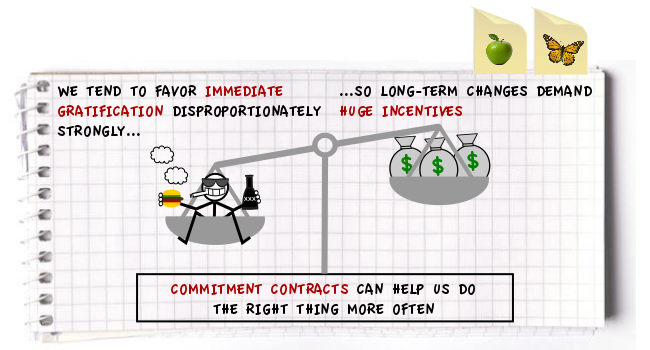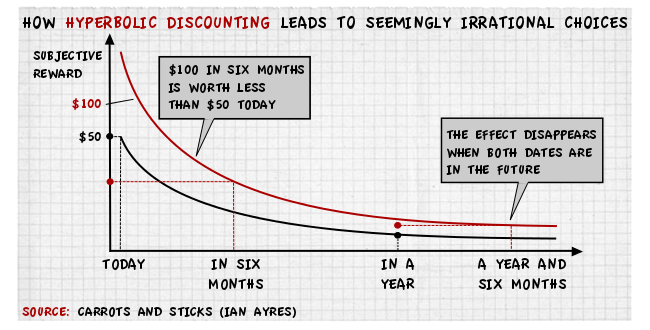Warning: file_get_contents(): php_network_getaddresses: getaddrinfo failed: Name or service not known in /www/htdocs/w00e5436/Handbook/wp-content/plugins/digg-digg/include/dd-class.php on line 1202
Warning: file_get_contents(http://feeds.delicious.com/v2/json/urlinfo/data?url=http%3A%2F%2Fhandbookofawesome.com%2F2011%2F12%2Fwhy-today-kicks-tomorrows-ass%2F): failed to open stream: php_network_getaddresses: getaddrinfo failed: Name or service not known in /www/htdocs/w00e5436/Handbook/wp-content/plugins/digg-digg/include/dd-class.php on line 1202
“Always do sober what you said you’d do drunk. That will teach you to keep your mouth shut.” (Ernest Hemingway)

We frequently make promises to ourselves regarding the future: “I will quit smoking”, “I will lose weight”, “I will stop sniffing glue”, and so forth. Often, we feel supremely confident when making these commitments, since at that stage the bulk of the unpleasantness still lies in the future, and depriving ourselves of pleasure tomorrow seems like a breeze today. When tomorrow rolls around, however, the appeal of e.g. smoking becomes immensely more powerful and nine times out of ten, your determination crumbles.
In his book Hotheads, Steven Pinker argues that evolution has made us short-sighted when it comes to rewards and punishments. In the good old days of sharpened sticks and leopard-skin loincloths, you never knew if you’d still be around tomorrow, presumably due to all those saber-toothed tigers prowling around. Hence it was usually beneficial for our forefathers to eat, drink and screw sooner rather than later.
The effect of this can still be seen today as a tendency for “hyperbolic discounting” when we evaluate rewards and punishments. We favor instant gratification disproportionately strongly compared to any later incentives, and even considerably larger future rewards are sometimes discarded in favor of smaller immediate ones. Similarly, hyperbolic discounting also makes us unrealistically confident about our ability to endure unpleasantness in the future, and to a smoker, a cigarette will seem infinitely more tempting today than you imagined yesterday.
The good news is that there is a way to offset this effect: You simply need to give yourself a disproportionately huge incentive in the future that can compete with the smaller incentive today. As Ian Ayres writes in Carrots and Sticks, if you are really serious about e.g. giving up smoking, you can make a “commitment contract” with a friend saying that you will pay him something ludicrous like 1000 Euros for every cigarette you smoke. I know it sounds pretty steep, but it has to be so that you can discount the hell out of it and still have a powerful incentive to quit.
Of course this works with rewards as well, so if you can find someone who’ll pay you 1000 Euros for not smoking, good for you! Most likely though it will be easier to set up a negative incentive rather than enlist a benevolent billionaire willing to sponsor your personal goals (we are open for applications though).
A few simple steps to get started:
- Think hard about a habit that is not in line with your long-term goals, which you would like to drop.
- Decide on a suitable monetary punishment for yourself should you fail. Make it so large that it hurts physically when you think about the impact of this punishment on your bank account.
- Make a trusted friend the referee for this wager against yourself and decide on your least favorite charity. Tell the referee you will donate the agreed-upon sum to the charity if you can’t keep your promise.
- Announce your project publicly to increase the peer pressure. Facebook is one way to go, another is to use a purpose-designed service like www.stickk.com, where you can publicly make “commitment contracts”.
- Be aware of the situations where you usually relapse into your old habits. After work? At bars? With certain people? Do your best to steel yourself when you encounter these circumstances, and remind yourself of the huge monetary loss you face.
Good luck, and be careful what you commit to.










